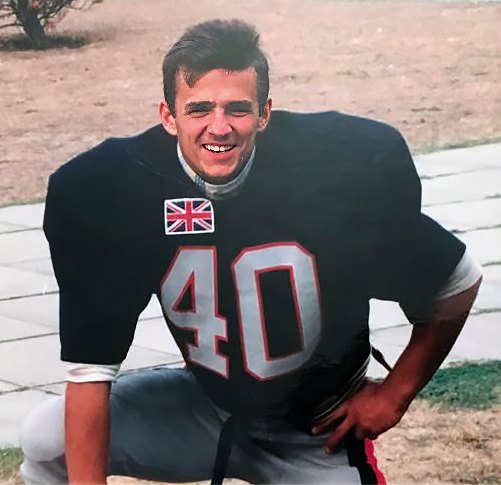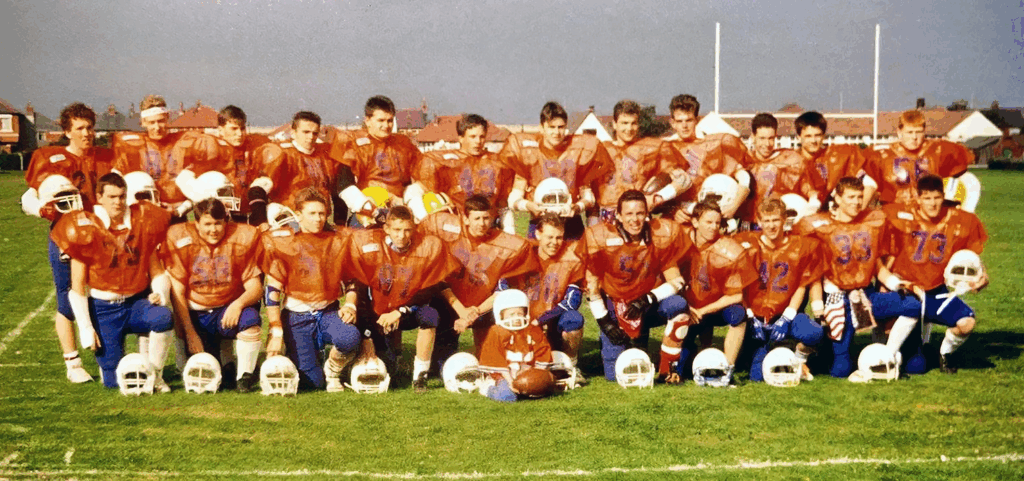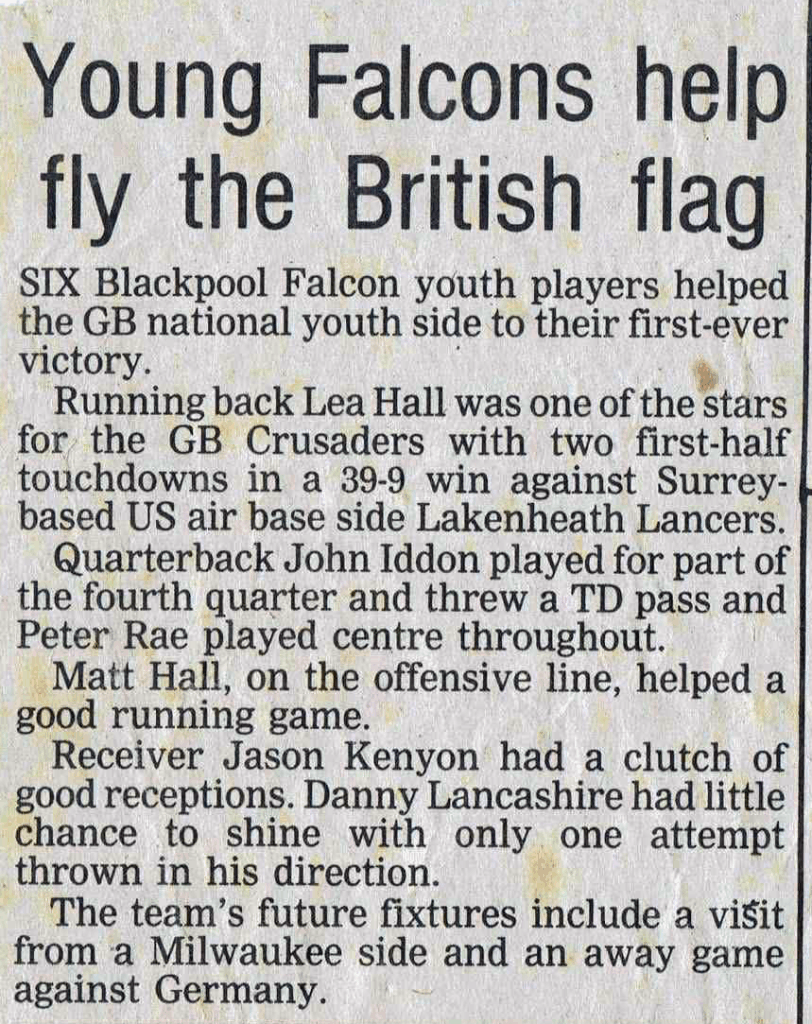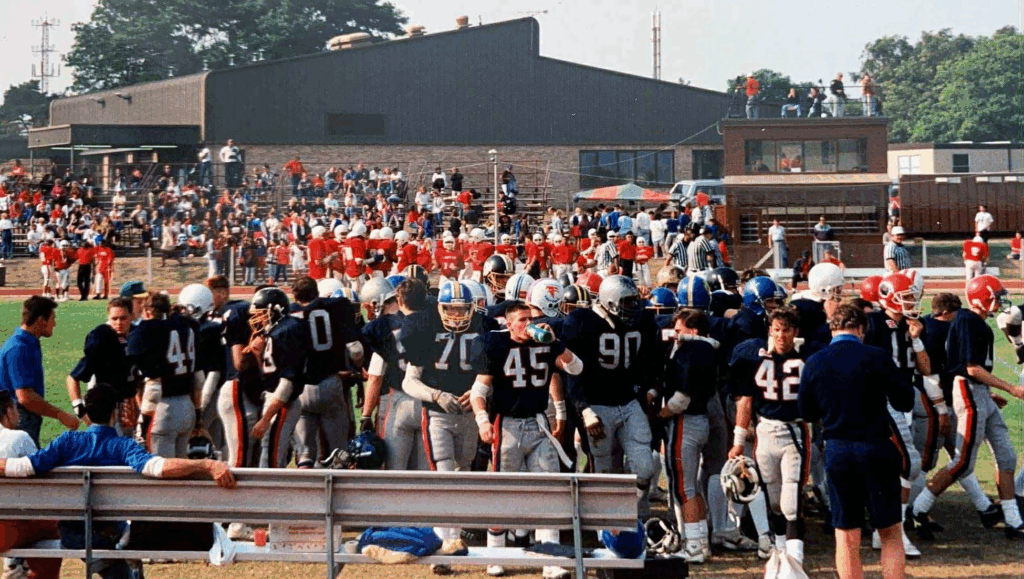Lea Hall: From Blackpool Parks to the GB

For Lea Hall, a sleepless night in the mid-1980s became the first step in a journey that would see him represent Great Britain on the gridiron. Lying in bed with his black-and-white TV flickering in the dark, he stumbled across Super Bowl XX—the Chicago Bears dismantling the New England Patriots. “It was the whole Chicago Bears team,” Lea says. “The way they moved about the field… it just clicked.” That spark would ignite a passion that still burns today.
Years later, that same boy from Blackpool found himself at an NFL summer camp in 1991, not only meeting his childhood idol Walter Payton—but also being wrapped head-to-toe in tape by teammates for “talking too much.” It was all part of the brotherhood that defined his Britball story.
A Chance Encounter in Blackpool
Soon after that fateful Super Bowl, Lea was out shopping with his mum when he spotted a boy with the same Kangaroo trainers. The boy, Danny Bell, mentioned hearing about a new youth team forming in the area. The next day, they met up in Stanley Park, where two senior players from the Fylde Falcons confirmed that a youth flag team was starting. They introduced the boys to Ken and Muriel Benson—owners of the Falcons and key figures in establishing youth Britball in the region.
“Ken and Muriel were a wonderful husband and wife team,” Lea recalls warmly. “When I was about to move up to the senior team, Muriel told me, ‘Focus on your speed.’ I never forgot that.”
Growing with the Falcons
Under the guidance of Coach Eddie Dobson, Lea’s early football education was intense and wide-ranging. “Coach Dobson was brilliant,” he says. “He took on coaching us while still playing for the senior team. He was there at the start and moulded me into who I am today.”
Lea played almost every position during two-touch football—quarterback, wide receiver, linebacker, returner—and continued to be a Swiss Army knife when the team moved to full kit. “I loved beating players who were bigger, faster, stronger,” he says. “I once scored five touchdowns in a game.”
The 1991 season was a highlight for the Falcons. “We made the semi-finals and had a huge rivalry with the Leeds Cougars—proper Roses matches.”
Challenges were part of the game too. “There were no coaches or playbooks. We taught ourselves through whatever NFL we could find on VHS or late-night TV.”
Among his favourite memories: the 1989 game against Northampton where he scored five touchdowns (despite the loss) and the 1991 quarter-final against the Nottingham Hoods. “We scored 50 points, and six different players got touchdowns. That was our best team performance.”

Representing Great Britain
Lea’s club success opened the door to the national team. His coach spotted the GB U19 trials, and six Falcons players went for it. “It was an awesome experience,” he says. “Just being around the best in the country.”
At RAF Lakenheath, he played in front of the biggest crowd he’d ever seen. “The GB team was like a machine—we had coaches for every position, everything was organised.”

He faced off against Team USA in the TAC3 tournament. “They looked massive,” Lea laughs. “Before the game I stood next to their linebacker, who was way taller than me. I pretended to brush snow off his helmet.”
That didn’t stop him from making an impression. After the game, a U.S. defensive back brought a tall man over to meet him. “‘Turn around,’ he said. I honestly thought I was in trouble! But he pointed at my jersey and said, ‘That’s what I saw all game—your back. Well played.’ Then he shook my hand. I’ll never forget that.”
Lea proudly remembers 1991 as the only year GB beat Team USA. He believes he still holds a British record: the fastest touchdown and quickest two touchdowns scored against the Americans.

The Brotherhood Beyond the Field
“American football made me who I am,” Lea says. “The friends I made in 1986 are still in my life. Danny Bell—the first person I asked about the game—is still around.”
And then there’s the off-field camaraderie. Like the time he missed curfew and was taped up by teammates. Or the infamous playoff-clinching win over Leeds Cougars: “I was injured and wasn’t supposed to play, but I told my coach I was fine. Got our kit man to drive me home, grabbed my gear, played fullback, and scored from the 3 and 5-yard lines. We won. The lads ripped my clothes off and made me walk back to the changing rooms half-naked!”
Lea even modelled for Coca-Cola’s American football merchandise line—just another chapter in a wild and joyful ride through early Britball.
A Coach Returns
After two decades away from the sport, Lea found his way back through an unexpected route: sales. “I learned how to build teams, share best practice, and train people to be better. I realised those were the same principles from football. That springboarded me back into coaching.”
Today, he’s head coach at Lancaster Bombers University, passing on his knowledge and love of the game.
His message to young players is crystal clear: “This is a team sport where everyBODY has a role, no matter who you are or where you come from. The friendships you build—money can’t buy that.”
Britball Roots, Lasting Legacy
To be recognised as part of Britball History means the world to Lea. “It’s incredible to think I was there near the foundation—one of the original Fylde Falcons youth players. Now I get to give back as a coach. That’s what it’s all about.”

